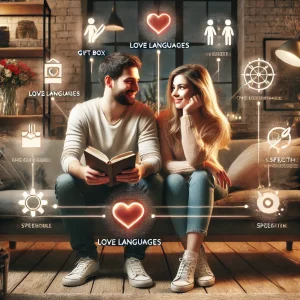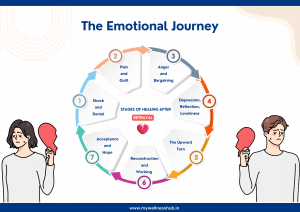Balancing Love: Realistic Relationship Expectations
By Prapoorna M
Last Updated: March 2, 2024
In the journey of love and partnership, navigating the sea of relationship expectations is often akin to balancing dreams with reality. It’s a delicate dance between what we hope for and what is practically attainable.
This dichotomy between our dreams and reality leads to a myriad of challenges. It’s not uncommon to face disappointment when a partner fails to meet our often-unspoken expectations. Or perhaps we find ourselves compromising on dreams that once felt non-negotiable. These challenges can range from minor disagreements to deep-seated issues that question the very foundation of our relationships.
Our goal in this article is to shed light on these challenges and provide you with practical tips to manage your relationship expectations effectively. We aim to guide you in setting realistic expectations, enhancing communication, and finding a balance between your individual dreams and the shared reality of your partnership.
Book Relationship Counselling now.
Understanding Relationship Expectations
What Are Relationship Expectations?
Relationship expectations are the beliefs and desires we hold about what we want and hope to receive in a relationship. These expectations can encompass emotional support, love, understanding, communication style, and even day-to-day interactions. They act as an internal blueprint, shaping how we engage with our partners and what we believe a fulfilling relationship should look like.
Standards vs. Expectations in Relationships
It’s crucial to differentiate between standards and expectations. Standards are the non-negotiable principles that govern our choices in partners. These might include respect, loyalty, or a sense of humor. Expectations, on the other hand, are more about specific behaviors or outcomes we hope to see in our relationships. For example, expecting a partner to always know what we’re feeling without us having to communicate it.
Formation of Expectations
Our expectations in relationships are often shaped by a variety of influences. Media, such as romantic films and social media, can paint idyllic images of love and partnership, setting a high bar for real-life relationships. Personal experiences, from past relationships to family dynamics, also play a significant role in forming these expectations. For instance, someone who grew up in a family where open communication was valued might expect the same level of transparency in their romantic relationship.
Also read: Social Media’s Impact on Relationships Explained
The Impact of Unrealistic Expectations
The Downside of Unrealistic Expectations
Unrealistic expectations in relationships can be a recipe for disappointment and conflict. When we set the bar too high or expect things that are not feasible, it leads to a constant state of dissatisfaction. For example, expecting your partner to always understand your needs without communication, or to be the sole source of happiness in your life, is not just unrealistic but also unfair to both parties.
Examples of Unrealistic Expectations
- Expecting Perfection: Believing that your partner should be flawless, never making mistakes or disappointing you.
- Complete Happiness Fulfillment: Relying on your partner to be the sole provider of your happiness and well-being.
- Mind Reading: Expecting your partner to always know what you’re thinking or feeling without verbal communication.
Consequences of Unrealistic Expectations
Failing to manage and temper these unrealistic expectations can lead to a cascade of relationship problems. Constant arguing over unmet expectations, feeling unappreciated, and an overall sense of dissatisfaction are common outcomes. It’s like trying to fit a square peg into a round hole; no matter how much you try, it just won’t fit.
Read more: Coping with Relationship Anxiety: Techniques and Tips
Realistic vs. Unrealistic Expectations
| Unrealistic Expectation | Realistic Expectation | Impact of Unrealism |
|---|---|---|
| Partner fulfilling all emotional needs | Partner as one of many sources of emotional support | Leads to disappointment, over-dependence |
| Partner always knows what you’re thinking | Communicating needs and feelings openly | Causes misunderstandings, frustration |
| No conflicts or arguments | Healthy conflicts as part of growth | Results in suppressed feelings, unrealistic harmony |
| Partner changes their core personality for you | Accepting and loving partner as they are | Leads to resentment, unrealistic relationship ideals |
| Partner makes you happy all the time | Finding happiness within, partner adds to it | Causes dependency, unrealistic happiness source |
| Constant romance like in movies | Real-life romance with ups and downs | Leads to disillusionment, pressure to perform |
| Immediate resolution of all problems | Understanding that some issues take time to resolve | Leads to impatience, unrealistic problem-solving |
| Partner prioritizes you over everything else | Balancing relationship with other life aspects | Causes imbalance, undue pressure on the relationship |
| Never experiencing doubt or uncertainty | Accepting that doubt is a normal part of relationships | Results in anxiety, unrealistic certainty |
| Agreement on every issue | Respecting and valuing different opinions and perspectives | Leads to loss of individuality, suppressed opinions |
Setting Realistic Expectations
Tips for Setting Realistic Expectations
- Reflect on Personal Values: Start by understanding your own core values and beliefs. What’s most important to you in a relationship? Honesty, loyalty, adventure? Align your expectations with these values.
- Understand the Difference Between ‘Need’ and ‘Want’: Distinguish between what you absolutely need from your partner (such as respect and understanding) and what you want (like shared hobbies). Needs are essential for a healthy relationship, while wants can be negotiable.
- Set Achievable Goals: Aim for attainable objectives in your relationship. For instance, instead of expecting constant attention, look for consistent communication and quality time together.
Read more about the Nature of Grief and managing emotions in relationships.
The Role of Communication
- Open Dialogue: Regularly talk about your expectations with your partner. This doesn’t have to be a formal conversation but a casual, ongoing dialogue.
- Listen Actively: Pay attention to what your partner expects from you. Understanding their perspective can help create a more balanced relationship.
- Use ‘I’ Statements: When discussing expectations, focus on your feelings rather than accusing or blaming. For example, say “I feel valued when you help me with household chores” instead of “You never help around the house.”
For further insights into effective communication, explore our comprehensive guide on Improving Listening Skills.
Balancing Dreams with Relationship Realities
- Accept Imperfections: Acknowledge that neither you nor your partner is perfect. Embrace the flaws as part of your journey together.
- Adjust Expectations: Be prepared to modify your expectations based on the evolving dynamics of your relationship.
- Support Each Other’s Dreams: While staying realistic, encourage each other’s aspirations. Find ways to integrate individual goals into your relationship.
Also Read: Better ways to communicate in relationships
Healthy Relationship Practices
Key Practices for a Healthy Relationship
- Showing Appreciation: Regularly express gratitude for the things your partner does, both big and small. This reinforces positive behavior and fosters mutual respect.
- Practicing Compassion: Be empathetic towards your partner’s feelings and experiences. Try to understand their perspective, especially in conflicts.
- Respect Each Other: Respect is fundamental in any relationship. It means valuing each other’s opinions, feelings, and boundaries.
The Importance of Compromise and Understanding
- Find Common Ground: In disagreements, look for solutions that satisfy both partners. This might mean alternating decision-making or finding a middle path.
- Respect Differences: Understand that you and your partner may have different approaches and viewpoints. Respect these differences as a part of what makes your relationship unique.
Dealing Constructively with Disappointments
- Communicate Your Feelings: If you’re disappointed, express your feelings calmly and clearly without placing blame.
- Learn from Experiences: Use disappointments as opportunities to learn more about each other’s needs and expectations.
- Focus on Solutions: Instead of dwelling on what went wrong, focus on how to prevent similar issues in the future.
Learn more about Dealing with Disappointment and how to navigate these challenging emotions.
Maintaining Individuality and Personal Growth
The Importance of Personal Growth in Relationships
In the journey of togetherness, it’s vital not to lose sight of one’s own personal growth and individuality. A healthy relationship is one where both partners grow together, but also as individuals. This individual growth contributes significantly to the strength and depth of the relationship.
Explore our article on Personal Growth for more insights into self-development.
Contributing to Healthier Relationship Dynamics
- Enhanced Self-awareness: Personal development leads to better self-awareness. Understanding your own needs, desires, and areas for growth can help in communicating more effectively with your partner.
- Increased Resilience: As you grow individually, you become more resilient and capable of handling relationship challenges constructively.
- Fostering Mutual Respect: When both partners are committed to personal growth, it fosters a mutual respect for each other’s aspirations and dreams.
Balancing Personal Aspirations with Relationship Commitments
- Set Aside Time for Personal Interests: Dedicate time to pursue your hobbies or interests. This not only nurtures your individuality but also brings fresh energy into your relationship.
- Support Each Other’s Goals: Encourage your partner in their personal goals and aspirations. Celebrate their achievements and be a source of motivation.
- Communicate Your Needs: Regularly communicate your personal needs and goals with your partner. This ensures that you both are on the same page and can support each other effectively.
Building and Maintaining Trust
The Role of Trust in Managing Expectations
Trust is the cornerstone of any relationship. It helps in managing expectations by fostering a safe environment where both partners feel heard and respected. Trust reduces the gap between expectations and reality by encouraging honesty and openness in the relationship.
Strategies for Building Trust
- Be Consistent: Consistency in your actions and words builds trust over time. Keep your promises and be reliable.
- Practice Open Communication: Share your thoughts and feelings openly. This transparency is key to building trust.
- Show Vulnerability: Allowing yourself to be vulnerable with your partner can strengthen trust. It shows a willingness to share the deeper, more authentic parts of yourself.
Balancing Expectations with Trust
- Understand and Respect Boundaries: Trust involves understanding and respecting each other’s boundaries. This is crucial for balancing expectations without overstepping.
- Deal with Conflicts Constructively: When conflicts arise, dealing with them constructively and respectfully can help in maintaining trust.
- Give the Benefit of the Doubt: In situations where expectations aren’t met, give your partner the benefit of the doubt. This helps in maintaining a trustful atmosphere where both partners can discuss and realign their expectations.
Understanding the Social Impact of Stress can also play a significant role in trust-building.
Strategies for Building Trust
| Strategy | Action | Outcome |
|---|---|---|
| Consistency | Keeping promises, being reliable in actions and words | Builds a sense of security and predictability |
| Transparency | Open and honest communication, sharing thoughts and feelings | Fosters understanding and openness |
| Active Listening | Paying full attention, acknowledging feelings, not interrupting | Creates an environment of respect and empathy |
| Vulnerability | Sharing personal fears, desires, and weaknesses | Enhances emotional closeness and understanding |
| Accountability | Admitting mistakes, taking responsibility for actions | Builds respect and shows maturity |
| Respect for Boundaries | Understanding and honoring each other’s limits and needs | Promotes independence and personal space |
| Supportive Actions | Offering help and understanding in times of need | Strengthens reliance and partnership |
| Quality Time | Spending meaningful time together, engaging in shared activities | Enhances connection and shared experiences |
| Positive Affirmations | Regularly expressing appreciation and affection | Reinforces love and commitment |
| Forgiveness | Letting go of grudges, moving past mistakes | Leads to healing and renewed trust |
Conclusion
In our exploration of managing relationship expectations, we’ve navigated through various facets of balancing dreams with the realities of partnership. Key takeaways from our discussion include understanding the nature of relationship expectations, setting realistic goals, the significance of communication, and the importance of trust and individual growth within a relationship.
If you’re considering professional guidance, our article on Relationship Counseling Online can offer further direction.
Frequently Asked Questions:
1. What are realistic expectations in a relationship?
Realistic expectations in a relationship include mutual respect, open communication, understanding, and emotional support. It’s about expecting honesty and effort, rather than perfection or constant happiness.
2. How can I effectively communicate my expectations to my partner?
Effective communication of expectations involves clear, honest, and respectful dialogue. Use ‘I’ statements to express your feelings and listen actively to your partner’s needs and expectations.
Discover effective ways to communicate in relationships with our guide on Online Counseling for Men.
3.What should I do when my expectations in a relationship are not met?
When expectations are not met, it’s important to communicate your feelings calmly and understand the situation from your partner’s perspective. Assess if your expectations were realistic and work together to find a compromise.
For strategies to manage disappointment, see our insights on Handling Disappointment.
4. How can maintaining individuality contribute to a healthy relationship?
Maintaining individuality in a relationship allows both partners to grow independently, which contributes to a healthier and more dynamic relationship. It helps prevent dependency and keeps the relationship balanced and interesting.
5. Why is trust important in managing relationship expectations?
Trust is crucial in managing expectations as it fosters a safe environment where both partners can express their needs and concerns openly. Trust leads to more realistic and mutual expectations, enhancing relationship satisfaction.
6. Can unrealistic expectations damage a relationship?
Yes, unrealistic expectations can lead to disappointment, frustration, and frequent conflicts, damaging the relationship over time. It’s important to set achievable expectations and communicate openly to avoid misunderstandings.
Understand more about relationship dynamics in our discussion on Marital Bliss.
7. How can I balance my personal aspirations with my relationship commitments?
Balancing personal aspirations with relationship commitments involves open communication about your goals, supporting each other’s dreams, and finding ways to integrate individual aspirations into your shared life.
8. What role does compromise play in a relationship?
Compromise is key in a relationship as it helps resolve conflicts, respects both partners’ needs, and leads to mutually satisfying solutions. It’s about finding a balance between giving and taking in the relationship.
9. How can I build and maintain trust in my relationship?
Building and maintaining trust involves being reliable, honest, and transparent with your partner. Show vulnerability, keep promises, and handle conflicts constructively to strengthen trust.
Learn more about building trust in our feature on Relationship Counselling.
10. Where can I find more resources on managing relationship expectations?
For more resources on managing relationship expectations, visit Wellness Hub. We offer a wide range of articles, tips, and guidance on building healthy and fulfilling relationships.
About the Author:
Prapoorna Mangalampalli
M.Sc., M.A., (Dual Masters in Psychology & English) – Counselor (6+ years of experience)
Prapoorna armed with a passionate dedication fueled by dual Master’s degrees in Psychology and English, Prapoorna sheds light on and elevates human experiences. Over 6+ years of experience fuel her insightful approach to counseling, offering profound empathy and guidance across diverse areas like online, marital, relationship, child, family, and career counseling.
At Wellness Hub, she thrives in a team environment that values innovation, compassion, and achieving results for their clients.
Connect with Prapoorna to learn how she can help you or your loved one find their voice and build a brighter future.
Book your Free Consultation Today
Parent/Caregiver Info:
Client’s Details:
* Error Message









